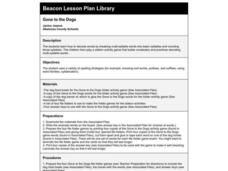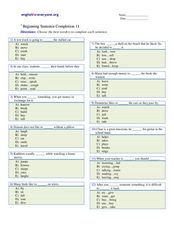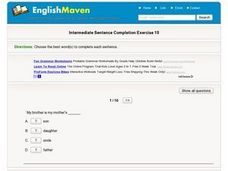Curated OER
Come To Your Senses
Write narratives that include ideas, observations, or memories of an event or experience, and be sure to use concrete sensory details! Groups utilize a few of the famous I Spy books in order to create narratives that utilize sensory...
Curated OER
Basic Visual Language
Students gain knowledge of the basics of visual communication. They are introduced to the three fundamental elements of visual language. Those are: camera angle, lighting, and compositions. Students video each other from different angles...
Curated OER
What Are You Doing? ??Que Pasa?
Learners better appreciate the variety and utility of languages spoken around the world. Then they study everyday words in two languages. Students also construct a system of flashcards to learn and test their new vocabulary knowledge.
Curated OER
Detective Game
In this book report worksheet, students answer questions about a book report asked in detective language. Students complete 5 questions.
Curated OER
All About Me
First, have each English language learner fill out the 15 sentence frames. Then, pair up your learners and have each share their completed sentences. There's a place for the listening partner to record his or her partner's sentences....
Curated OER
Descriptive Writing
Have your class practice using descriptive language in their writing. This resource provides learners with a list of terms and adjectives. For example, one slide shows a picture of a wolf, and then lists descriptions, such as moon howler...
Denver Art Museum
Checking for Accuracy
Young appreciators of art consider the sculpture, The Things I Have to do to Maintain Myself, by Roxanne Swentzell. Everyone gives their opinion as to what the figure in the sculpture is doing. After they learn that the image portrays a...
Curated OER
Gone to the Dogs
Approach vocabulary through decoding and chunking. Your class breaks up words into basic syllables or chunks then engages in a decoding activity. Useful for a variety of language levels and grades, just modify to fit your class.
Curated OER
Stomping and Romping with Shakespeare
Did you know that Green Eggs and Ham is written in iambic pentameter? Model the rhythm of language using Dr. Seuss’s tale. Direct class members to march about the room tapping their right foot on the first syllable and stomping their...
Curated OER
Aim for Your Goal
Students write a story about their achievements in a sport, or their dreams for success in other areas. They create original works of art depicting their goals or anticipated achievements. They then display their stories and art.
Curated OER
Poetry in Triple Textures
Learners compare and contrast visual and tactile textures. They create a painting that highlights one or more textures. Students express these textures in a poem to accompany their art. They recognize that words can express the visual...
Curated OER
Port Portrait
Students research and identify exciting places to visit and plan an imaginary cruise, using maps, to study other languages, climates and geography and draw scenes from your trip. They make a portrait of your group waiting to leave one...
Curated OER
Rhyme Brainstormers
Students identify words that rhyme and realize that this literacy skill is engaging. Then they prepare their own language game props. Students also monitor each other in following rules, erasing duplicate words, and scorekeeping....
Curated OER
Rhyme Time Flipbook
Students identify the characteristics in the English language that result in rhyming words. They record and collect rhyming words in an appealing flipbook format. They then flip through their book to find rhyming words, when they think...
Curated OER
There Was an Old Woman Who Swallowed a Fly
Here is an entertaining way to introduce your language learners to several significant grammatical structures. The children’s rhyme, There Was an Old Woman Who Swallowed a Fly, contains examples of noun and relative clauses for the class...
Curated OER
The Present Is Perfect: Using Present Perfect Tense
Your developing language users rewrite 10 sentences by changing the underlined verbs to present perfect tense verbs with one of the helping verbs: have, has, or had. Resource contains explanatory material as well as a practice worksheet.
Curated OER
When Was the First Time You...?
Promote conversation with this questioning worksheet. Perfect for English language learners to practice basic conversational vocabulary, typical questions are "When was the first time you took a trip without your family?"
Curated OER
Beginning Sentence Completion 11
Help your English language learners use the appropriate verbs to complete their thoughts. Have them practice with this multiple choice worksheet. There are 12 sentences provided, and the learner has to choose the best verb (out of five...
Curated OER
Beginning Sentence Completion 9
English language learners choose the correct multiple choice option to complete 12 sentences. There is no common theme here, so this might function best as a time-filler.
Curated OER
Intermediate Sentence Completion 10
Provide your English language learners with some additional practice completing sentences. They have to select the word that makes the most sense in 12 sentences. This sheet is designed for intermediate learners, as some of the...
Curated OER
Verb Review: Present/Past
The conversational style of the sentences (Some exercises are actual dialogues, which could make good oral language practice.) in this practice sheet makes it perfect for ELD class or native speakers. The five exercises here encompass...
Curated OER
Using the Progressive (-ing) Forms
English language learners or pupils polishing their basic grammar skills work with the progressive verb tense. In the first exercise, they must change the verb from its infinitive to the progressive tense. Then, they use the progressive...
Curated OER
Verbs: Present Progressive
Explore the present progressive tense with your English language learners. Study the first chart, noticing the verbs that are used. Then use the same six verbs to complete sentences in the second chart.
Curated OER
Using "Can"
English language learners or young native English speakers practice using the word can in the six sentences provided. They match the beginning of each sentence provided with the appropriate phrases in the word pool.
Other popular searches
- 5th Grade Language Arts
- 3rd Grade Language Arts
- 4th Grade Language Arts
- Second Grade Language Arts
- English Language Arts
- 1st Grade Language Arts
- Kindergarten Language Arts
- Language Arts Jeopardy Game
- First Grade Language Arts
- Language Arts School Projects
- Language Arts Lesson Plans
- Language Arts Games

























